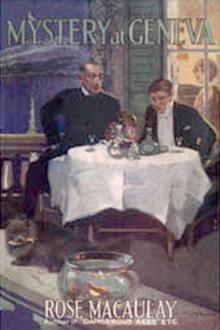 Cover of first edition (1922)
Cover of first edition (1922)
Book Review by Kathryn R: Mystery at Geneva – An Improbable Tale of Singular Happenings is a short novel, telling the story of Henry Beechtree, a newspaper correspondent for the British Bolshevist who is in Geneva for a meeting of the League of Nations in the early 1920s.
The book opens with the following note from the author:
Note: As I have observed among readers and critics, a tendency to discern satire when none is intended, I should like to say that this book is simply a straightforward mystery story, devoid of irony, moral or meaning.
It has for its setting an imaginary session of the League of Nations’ Assembly, but it is in no sense a study of, still less a skit on actual conditions at Geneva of which indeed I know little.
The only connection I have ever had with the League being membership of its Union.
This note tells us what to expect. The novel is, of course, a satire, full of irony and a skit on actual conditions and the mystery aspect is disappointing – especially if the reader were expecting a mystery story.
The plot such as it is, involves the disappearance of the President of the assembly, a member of the Norwegian delegation, followed by the disappearance of other members of Committee Nine.
At the end of the novel there are two surprising plot twists.
The satire is based on racial/ national stereotypes with members all reliving old and recent rivalries. Members representing different countries are quick to blame their enemies for the organising the disappearances.
The Irish Republicans blame the Loyalists and the Black and Tans and vice versa, the Russian Revolutionaries blame the Russian Monarchists, the Turks, the Greeks and so on. The list of those blaming each other is repeated several times throughout the novel like a refrain. Many of the comments and rivalries are still recognisable today.
When Macaulay wrote this novel the League of Nations had only been in existence for two years. Its aims included preventing wars through collective security and disarmament and settling international disputes through negotiation and arbitration. It was formally disbanded in 1946. (There is a long Wikipedia entry about the League.)
This novel suggests that Rose Macaulay did not have much faith in the League. In it she implies that the members are too focused on committees and bureaucracy to be effective. I feel that she thinks that the members are too unwilling to forget old scores to be able to resolve difficulties. (plus ca change!)
I listened to the book via Librivox, a free audiobook service. I found the satire and the repetitions amusing. I was surprised that when I listened to parts of it again in order to write this review, I found myself getting involved with the plot again and trying to see whether I could find clues to the plot twists.
I would recommend the book as it offers an insight to the League of Nations and 20th Century interwar history and is a good listen, once you get used to the voice of the reader. This is Cathy Barratt, who sounds like the voice of the Sat Nav on Radio 4s I’m Sorry I Haven’t a Clue, but I can’t find a record of this.
